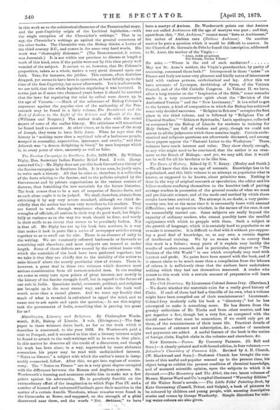Miscellanies, Literary and Religious. By Christopher Words- worth, D.D., Bishop
of Lincoln. 3 vols. (Rivingtons.)—The first
paper in these volumes dates back, as far as the work which it describes is concerned, to the year 1832. Dr. Wordsworth paid a visit to Pompeii, and it occurred to him that a literary interest might be found to attach to the wall-writings still to be seen in that place.
In this matter be deserves all the credit of a discoverer, and though his work has been since, in a way, superseded by more elaborate researches, his paper may be read with undiminished interest.
"Notes on Greece," a subject with which the author's name is insep- arably connected, follow. After this, we get into regions of contro- versy. The " Notes on France " are in a very great degree occupied
with the difference between the Roman and Anglican systems. Dr. Wordsworth's learning and acuteness enable him to make not a few points against his adversaries. He is peculiarly forcible on the extraordinary effort of the imagination to which Pope Pins IX. and a number of learned and unlearned Cardinals gave their sanction in the matter of a certain Aurelia Theodosia, whose remains were found in the Catacombs at Rome, and supposed, on the strength of a phial discovered near them, and the words " Nat. Allibiana," to have been a martyr of Amiens. Dr. Wordsworth points out that Amiens was not called Anibianum till the age of martyrs was past ; and that, apart from this, " Nat. Antbiana," cannot mean "born at Ambianum," but rather of Ambian race (Nations Ambiana. On another matter he puts a question which it would be difficult to answer. In the Church of St. Germain de Pres he found this inscription, addressed to St. Anne, the mother of the Virgin
Anna. redde propitium Per Natum, Natum Mum."
He asks, — " Where is the end of such mediators ?
May not St. Anne's mother, the Virgin's grandmother, by parity of reasoning, command them both ?" Interspersed in these " notes " on France and Italy are some very pleasant and kindly notes of intercourse held with various persons, ecclesiastical and lay. After this we have accounts of Lycurgus, Archbishop of Syros, of the Vatican Council, and of the Old Catholic Congress. In Volume II. we have, after a long treatise on the "Inspiration of the Bible," some remarks made in a very conservative spirit about the "Revision of the Authorised Version " and the " New Lectionary." It is a relief to get to the hymns, a kind of composition in which the Bishop has achieved some very decided successes. " Religion in Science" occupies the first place in the third volume, and is followed by " Religions Use of Classical Studies." "`Ethics et Spiritnalia,' Latin apothegms, collected or composed by the Bishop of Lincoln for students in training for Holy Orders," are full of wisdom and piety, though we could not assent to all the judgments which these maxims imply. Certain eccle- siastical and religious questions are afterwards discussed, and among these papers appear the "Pastoral Letter to the Wcsleyans." These volumes have much interest and value. They show clearly enough, to any who might need to be convinced, that the author is an orna- ment to the Bench of Bishops,—and yet, we may add, that it would not be well for all his brethren to be like him.


































 Previous page
Previous page